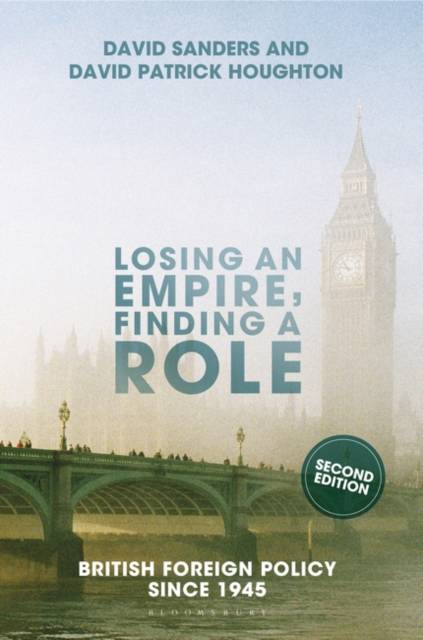
- Retrait gratuit dans votre magasin Club
- 7.000.000 titres dans notre catalogue
- Payer en toute sécurité
- Toujours un magasin près de chez vous
- Retrait gratuit dans votre magasin Club
- 7.000.0000 titres dans notre catalogue
- Payer en toute sécurité
- Toujours un magasin près de chez vous
Losing an Empire, Finding a Role
British Foreign Policy Since 1945
David Sanders, David Houghton
Livre broché | Anglais
89,95 €
+ 179 points
Description
Informed by Winston Churchill's famous metaphor, successive British governments have shaped their foreign policy thinking around the belief that Britain's overseas interests lie in three interlocking 'circles': in Europe, in the Commonwealth, and in the 'special relationship' across the Atlantic. Recent administrations may have updated the language in terms of 'bridges', 'hubs' and 'networks', but the notion of Britain as somehow at the centre of things remains a vital idea. In this updated edition of a classic text, David Sanders and David Patrick Houghton examine British foreign policy since 1945 through the prism of these three circles. Taking account of major developments from the ending of the Cold War, through 9/11 and the so-called War on Terror, to Britain's historic decision to leave the European Union, it provides a masterly account of Britain's changing place in the world and of the policy calculations and deeper structural factors that help explain changes in strategy.
Combining chronological narrative with careful consideration of the main theories of foreign policy analysis and international relations, this book provide a reliable and comprehensive introduction to the evolution of British external policy, including economic and defence policy, in the postwar period. Characterized by its accessible style and depth of analysis, and now fully updated in line with 21st century developments, Losing an Empire, Finding a Role will remain an invaluable guide to British foreign policy for students of international relations or foreign policy at any level.
New to this Edition:
- Updated coverage of events, including 'the War on Terror' and Brexit
- Reformulated analysisto cover the updates inscholarship
Combining chronological narrative with careful consideration of the main theories of foreign policy analysis and international relations, this book provide a reliable and comprehensive introduction to the evolution of British external policy, including economic and defence policy, in the postwar period. Characterized by its accessible style and depth of analysis, and now fully updated in line with 21st century developments, Losing an Empire, Finding a Role will remain an invaluable guide to British foreign policy for students of international relations or foreign policy at any level.
New to this Edition:
- Updated coverage of events, including 'the War on Terror' and Brexit
- Reformulated analysisto cover the updates inscholarship
Spécifications
Parties prenantes
- Auteur(s) :
- Editeur:
Contenu
- Nombre de pages :
- 384
- Langue:
- Anglais
Caractéristiques
- EAN:
- 9781137357144
- Date de parution :
- 10-01-17
- Format:
- Livre broché
- Format numérique:
- Trade paperback (VS)
- Dimensions :
- 160 mm x 237 mm
- Poids :
- 594 g

Les avis
Nous publions uniquement les avis qui respectent les conditions requises. Consultez nos conditions pour les avis.






